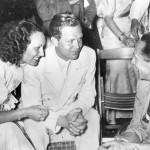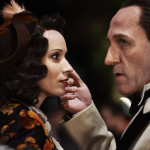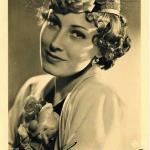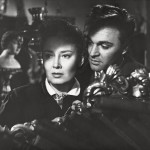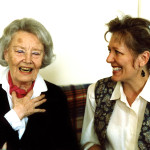While endless controversy surrounds the new film on the legendary Czechoslovak film star, a good documentary tries to shed new light on her life
“I could have become famous as Marlene Dietrich”, she once said, a few years before her death, while smoking yet another cigarette
The fact that a film about the turbulent life of Lída Baarová has aroused strong reactions among the Czech public surely comes as no surprise. This is, after all, the actress who should have become the “Czechoslovakian Marlene Dietrich”, in the thirties, but missed the opportunity to go to Hollywood and follow in the footsteps of the legendary Berliner star. Lída chose to stay in Germany and become the lover of the Third Reich’s Propaganda Minister, Joseph Goebbels. The relationship left a stain on her name in her homeland, and it would certainly be difficult to find a similar reversal of fortune in the life of another actor. With such a spectacular rise and fall, and a dramatic life full of tragic twists, a film adaptation of the story of the presumed “collaborator” was inevitable. Yet, no one would expect such a fierce reaction to the new film by Filip Renč, universally panned by Czech critics. But does it deserve such treatment? Or is it simply a thorny subject, on a difficult character to digest and to forgive for the Czech people?
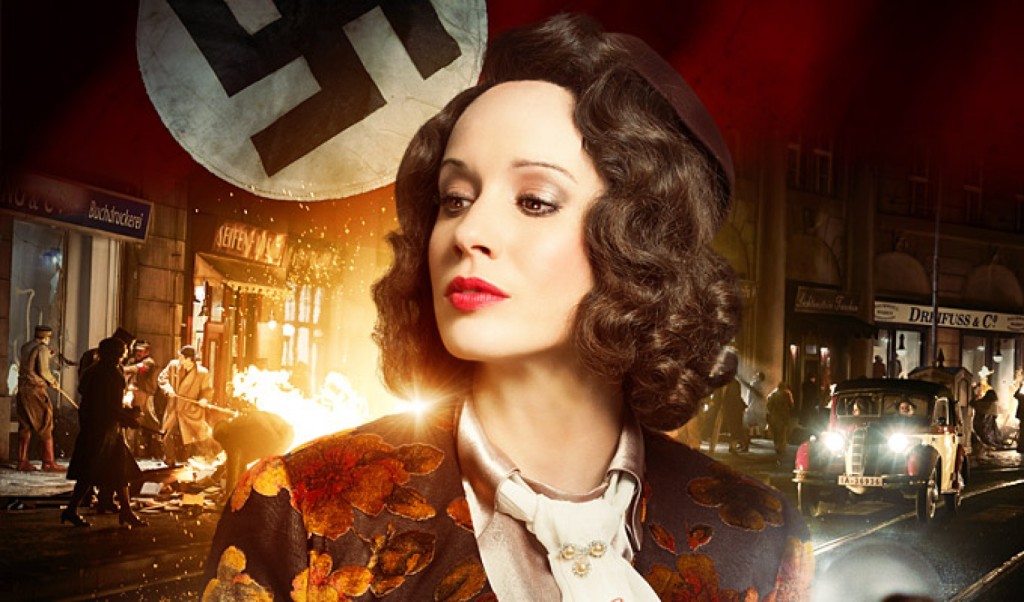 The film, simply titled “Lída Baarová”, in its homeland, but “The Devil’s Mistress”, in the international version, begins in the thirties. The Prague actress, born as Ludmila Babková (in 1914), is already among the most promising and popular actresses at home when she receives the offer to go to work for UFA studios in Nazi Germany. Despite language difficulties in her new country, and the fact that the German crew are not always confident in her acting abilities, Baarová manages to overcome the many obstacles on the path to international success, thanks also to the support from German actor Gustav Fröhlich, with whom she takes part in various films. The actor quickly becomes her first lover on German soil. However, things get complicated when Adolf Hitler and Joseph Goebbels visit the film studios, especially when the latter, despite being married, begins to woo the Bohemian.
The film, simply titled “Lída Baarová”, in its homeland, but “The Devil’s Mistress”, in the international version, begins in the thirties. The Prague actress, born as Ludmila Babková (in 1914), is already among the most promising and popular actresses at home when she receives the offer to go to work for UFA studios in Nazi Germany. Despite language difficulties in her new country, and the fact that the German crew are not always confident in her acting abilities, Baarová manages to overcome the many obstacles on the path to international success, thanks also to the support from German actor Gustav Fröhlich, with whom she takes part in various films. The actor quickly becomes her first lover on German soil. However, things get complicated when Adolf Hitler and Joseph Goebbels visit the film studios, especially when the latter, despite being married, begins to woo the Bohemian.
Unfortunately, right from the earliest scenes of the film we notice a rather awkward approach to what is, among many things, a historical film, with touches of humour, particularly in the scenes involving Lída’s mother, played by Simona Stašová, which seem out of place. However, also the choices of the leading actors seem to be quite puzzling. The beautiful Slovak actress Táňa Pauhofová, who was very impressive in the miniseries Burning Bush (“Hořící ker”, in 2013) on the events surrounding the death of student Jan Palach, bears little resemblance to the true Baarová, while lacking her screen presence. The choice of Czech actor Pavel Kříž in the role of Hitler has also gathered a fair share of criticism, while commercial requirements have also had a negative impact on the realism, such as the decision to dub German actors Karl Markovics (Goebbels) and Gedeon Burkhard (Fröhlich ), in Czech.
However it is also film’s centrepiece, the relationship between the actress and Goebbels, with historical events in the background, which falls flat. Many viewers will be disappointed by the fact that Renč appears to have little interest in the historical elements, and preferred to attempt an almost “Hollywood” style melodrama, only without possessing the necessary means at his disposal, and also avoiding to put due emphasis on what the allure was of the legendary actress about which legendary Czech director Otakar Vávra once said, “her beauty made every man she met fall in love with her”. Baarová instead, is portrayed as a naive child, almost completely unaware of what was happening in Europe, while the viewer struggles to feel emotionally involved in the story.
The film then proceeds to post-war story, when the Communists seize power in Czechoslovakia and the star, now in decline, is sentenced to imprisonment for her alleged collaboration with the Germans. At the same time, the violent interrogations from the new regime result in the death of her mother, and the tragic suicide of her younger sister Zorka Janů. Zorka, born Zora Babková, followed the footsteps of Lída, and was also in the past one of the promising Czechoslovak film actresses, appearing in films such as Baron Prášil (1940) by Martin Frič. However after the war she was ostracized and banished from the world of cinema due to the infamy of being the sister of a “collaborator”. The post-war scenes give a certain emotional kick to the film, thanks also to the performances of Anna Fialová (who perhaps would have been better suited to playing Lída than Pauhofová) in the role of her sister, and Martin Huba as her father. The development of these events however, is rather rushed, and the pacing of the film suffers accordingly.
On the other hand, there have even been those who have directly questioned the motives behind the making of “Lída Baarová”, and particularly the role of singer Daniel Landa as producer. Landa is well known in his homeland for his extreme right-wing political views, and consequently some have even accused the film of watering down the horrors of Nazism, especially in comparison to the violence (also psychological), suffered by Baarová’s family from the communist regime, which as mentioned earlier, led to the death of both her mother and sister.
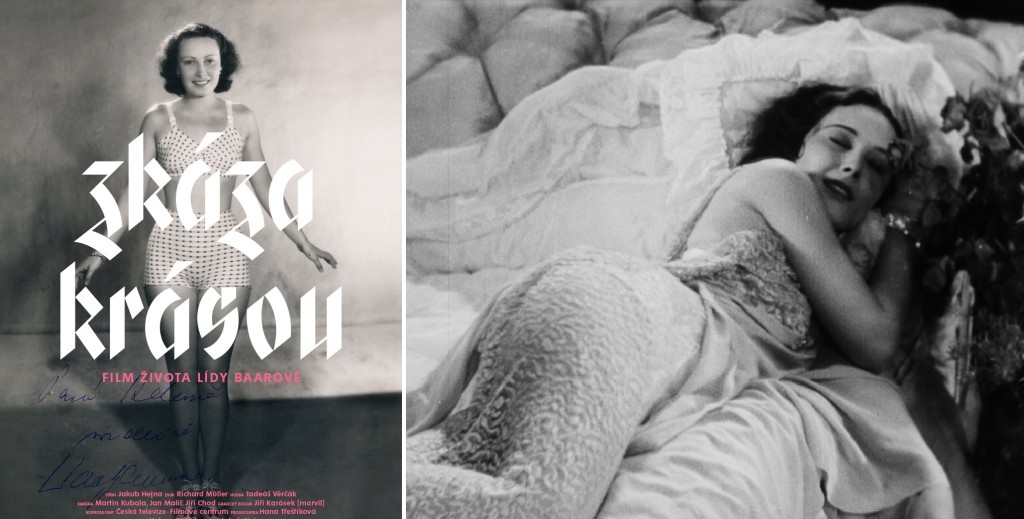 Fortunately early January, in addition to the disastrous film from Renč, also saw the release in Czech cinemas of the documentary “Zkáza krásou” (Doomed beauty) from Helena Třeštíková, undoubtedly one of the best documentary directors of the Czech Republic. Třeštíková had conducted an interview with the former actress in 1995, after nearly three decades of inactivity, at her home in Salzburg, where Lída Baarová would pass away five years later after suffering for some time from Parkinson’s disease. The documentary makes good use of the interview, and capably intersperses it with footage from various film clips from the archives of all the countries where the Baarová worked. This film retraces the life of the star too, from heyday, with the aforementioned legendary filmmakers Otakar Vávra and Martin Frič, as well as with actors Hugo Haas and Vlasta Burian, up until the Germans years, the relationship with Goebbels, the encounter with Hitler, and the difficult postwar years.
Fortunately early January, in addition to the disastrous film from Renč, also saw the release in Czech cinemas of the documentary “Zkáza krásou” (Doomed beauty) from Helena Třeštíková, undoubtedly one of the best documentary directors of the Czech Republic. Třeštíková had conducted an interview with the former actress in 1995, after nearly three decades of inactivity, at her home in Salzburg, where Lída Baarová would pass away five years later after suffering for some time from Parkinson’s disease. The documentary makes good use of the interview, and capably intersperses it with footage from various film clips from the archives of all the countries where the Baarová worked. This film retraces the life of the star too, from heyday, with the aforementioned legendary filmmakers Otakar Vávra and Martin Frič, as well as with actors Hugo Haas and Vlasta Burian, up until the Germans years, the relationship with Goebbels, the encounter with Hitler, and the difficult postwar years.
There is even a section devoted to the years she spent in Italy (from 1942 until 1945, and then from 1950 until 1955). It was in the Bel Paese where the diva was best able to showcase her acting ability, and the interview with Třeštíková reveals how grateful she was to have been able to work with illustrious names such as Vittorio De Sica, Eduardo and Peppino De Filippo, Amedeo Nazzari and especially Federico Fellini in his classic “I Vitelloni”. It is hard to get bored watching a documentary describing such a dramatic life, full of twists and turns, which could have ended differently had the Prague-born star not declined the offer to leave Germany to go to Hollywood. “I could have become famous as Marlene Dietrich”, said the elderly Bohemian star reflecting on her life while smoking yet another cigarette. Of course someone might still be disappointed by certain statements from Baarová, in which she seems indifferent about her relationship with Goebbels, and despite admitting her naivety, says her only major regret was that she turned her back on Hollywood. Perhaps it is for this reason that the actress, the greatest diva of the history of the Czech cinema, could never break free from the shadows of her past, and has never been loved by her compatriots like her contemporaries Adina Mandlová or Nataša Gollová. Despite a fascinating life and career, her story will always remain a difficult one to accept for the Czech people.
by Lawrence Formisano





